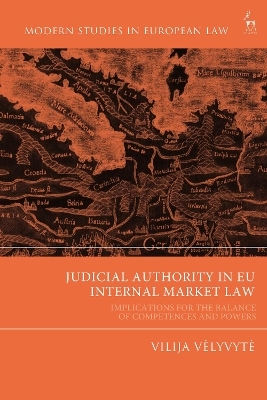
Judicial Authority in EU Internal Market Law
Hart Publishing (Verlag)
978-1-5099-6416-1 (ISBN)
Shortlisted for the UACES Best Book Prize 2023
Runner-up of the 2024 Peter Birks Prize for Outstanding Legal Scholarship
Vilija Velyvyte is British Academy Postdoctoral Fellow at the Law Faculty of the University of Oxford, UK.
Introduction
Context and Aims
Methodological Approach
Contribution
Structure
1. An Unfree Court: Constitutional Constraints on the Exercise of EU Judicial Authority
I. Structural Constraints: The Allocation of Competences and Powers in the EU
II. Substantive Constraints: The EU’s Constitutional Value Framework
III. Justification for Constraining the Court
IV. Conclusion
2. Free Movement Case Law in Light of the Principle of Conferral
I. The Principle of Conferral in Application to EU Judiciary
II. Healthcare
III. Education
IV. Collective Labour Law
V. Gambling
VI. The Implications of the Case Law for the Principle of Conferral
VII. Conclusion
3. Free Movement Case Law in Light of the Principles of Subsidiarity and Proportionality
I. The Principles of Subsidiarity and Proportionality, and their Application to the EU Judiciary
II. Healthcare
III. Education
IV. Collective Labour Law
V. Gambling
VI. The Implications of the Case Law for the Principles of Subsidiarity and Proportionality
VII. Conclusion
4. The Horizontal Balance of Powers: The Implications of Free Movement Case Law for the Principle of Institutional Balance
I. The Principle of Institutional Balance in Application to the Court
II. The Process of Judicial Lawmaking: Quasi-Legislative Judgments
III. The Legislative Process: Political Constitutional Constraints and the ‘Judicial Trap’
IV. Model of Interaction No 1: The Court Predetermines the Content of Legislation
V. Model of Interaction No 2: The Court Pre-empts Novel Legislative Solutions
VI. Model of Interaction No 3: The Court Prevents Legislative Overturn
VII. Conclusion
5. Rebalancing the Court, Rebalancing the EU
I. The Conceptual and Legal Basis for a Relaxed Judicial Review
II. The Margin of Appreciation
III. Fair Balance
IV. Exemption
V. Conclusion
Conclusion
Argument
Future Research
Significance
| Erscheinungsdatum | 08.05.2024 |
|---|---|
| Reihe/Serie | Modern Studies in European Law |
| Verlagsort | Oxford |
| Sprache | englisch |
| Maße | 156 x 234 mm |
| Themenwelt | Recht / Steuern ► EU / Internationales Recht |
| Recht / Steuern ► Öffentliches Recht | |
| Sozialwissenschaften ► Politik / Verwaltung ► Europäische / Internationale Politik | |
| ISBN-10 | 1-5099-6416-9 / 1509964169 |
| ISBN-13 | 978-1-5099-6416-1 / 9781509964161 |
| Zustand | Neuware |
| Haben Sie eine Frage zum Produkt? |
aus dem Bereich


